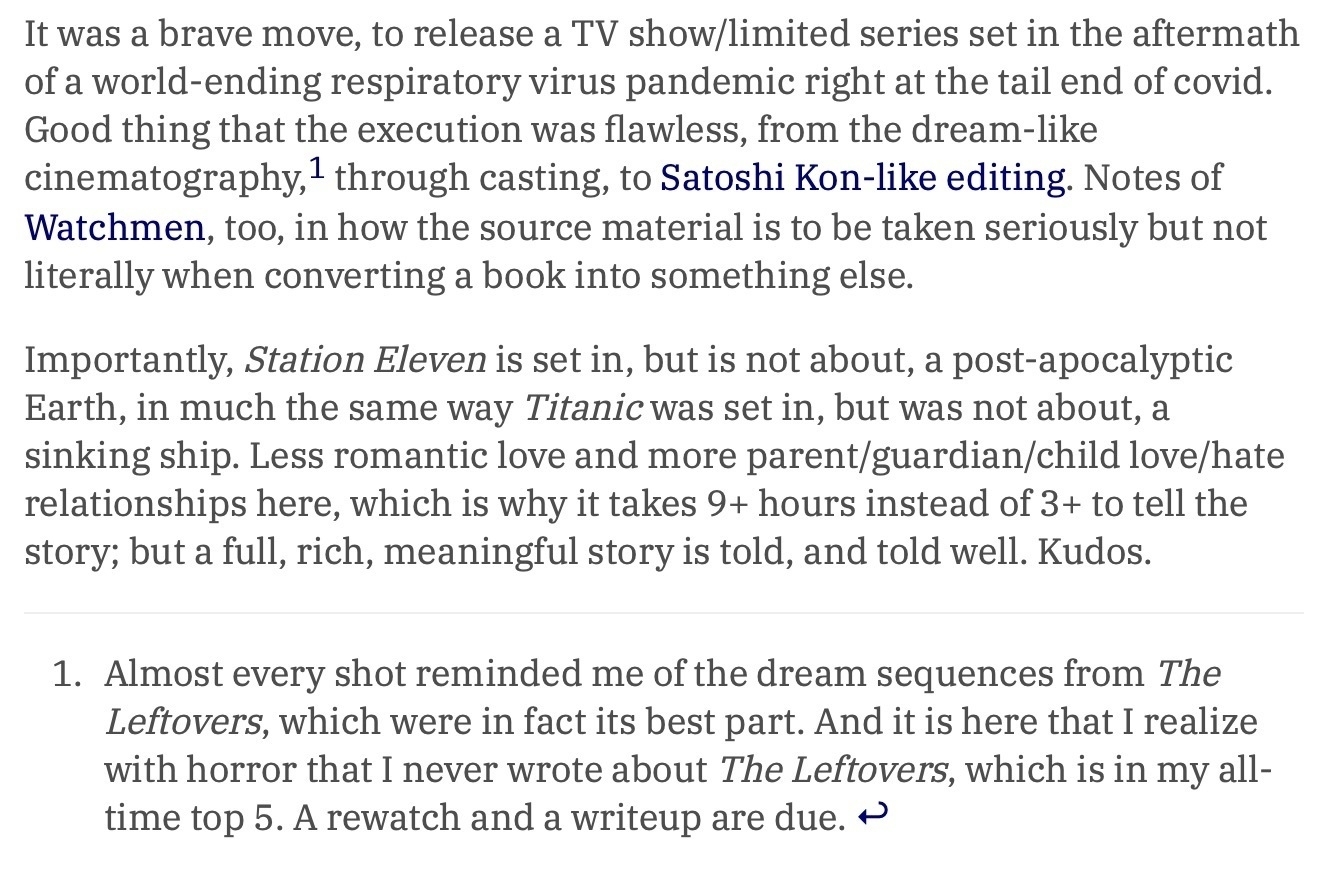📺 Season 2 of The Mysterious Benedict Society: bright colors, quirky characters, upbeat music, and all that in sunny Europe instead of Season 1’s dreary Northwestern US. What is there not to like?
📺 Wednesday started off strong but quickly devolved into 90210 with a high body count: enjoyable, but not quite living up to the atmosphere of the first episode. It was still worth sticking it out until the end to see Fred Armisen’s Uncle Fester.
If you have seen and enjoyed Bodyguard, make sure to watch Slow Horses. How good is it? First time I stayed up until 4am for a TV show since the early 2000s good. 📺
Magpie Murders were an absolute delight, even if the modern-day mystery was somewhat predictable. Looking forward to the Moonflower Murders, whenever they come out. 📺

Station Eleven
It was a brave move, to release a TV show/limited series set in the aftermath of a world-ending respiratory virus pandemic right at the tail end of covid. Good thing that the execution was flawless, from the dream-like cinematography,1 through casting, to Satoshi Kon-like editing. Notes of Watchmen, too, in how the source material is to be taken seriously but not literally when converting a book into something else.
Importantly, Station Eleven is set in, but is not about, a post-apocalyptic Earth, in much the same way Titanic was set in, but was not about, a sinking ship. Less romantic love and more parent/guardian/child love/hate relationships here, which is why it takes 9+ hours instead of 3+ to tell the story; but a full, rich, meaningful story is told, and told well. Kudos.
-
Almost every shot reminded me of the dream sequences from The Leftovers, which were in fact its best part. And it is here that I realize with horror that I never wrote about The Leftovers, which is in my all-time top 5. A rewatch and a writeup are due. ↩︎
“Most TV shows are not good. The key problems are that too much quality scripting is required, and that the incentives are to try to get the show extended for another season.” Mini-series FTW marginalrevolution.com/marginalr…
The Mysterious Benedict Society, Season 1
A Disney+ TV show that WoG followers would like. Villains are IYI vegans who live in modernist buildings and make children live by absurd and contradictory rules that only give an appearance of freedom (“You are free to go wherever you like, as long as you stay on the path”, to paraphrase one). Our heroes, both children and adults, are messy but resourceful, at home in both a Georgian mansion and the wilderness of (I assume, though it’s never specified) the Pacific Northwest.
It starts in a picturesque costal town right off of Townscaper. By the third episodes the children are stuck in a nightmareish brutalist school that is all acute angles and ’70s orange-white plastic furniture — not nearly as pretty to look at, but the puzzle-of-the-day aspect makes every episode worthwhile. It ends with most of the loose ends tied up but with promises of more to come. And Tony Hale is in almost evey scene. What’s not to love?
Mare of Easttown
Mare of Easttown is the best dead-girl-in-a-sad-town TV show to come out of the US since Twin Peaks. To be clear, the 30-some years that separate them still have many good shows of the genre, but none were American. When they weren’t busy churning out the millionth iteration of CSI, Americans could only muster pale copies of what came out of Britain and Scandinavia, with characters and plots lifted wholesale and Northern European sentiments crammed oddly into New England toponyms.
The Mare takes its setting more seriously, and not just with flannel shirts, odd accents, and dozens of bottles of Yuengling and Rolling Rock drunk per episode. You quickly learn that the town is not all that bad: it has decent homes, an upscale college and high school, and a pretty good sense of community. It’s the people who are sad, each in their own way and for their own reasons, with the titular Marianne the saddest of them all, and the show mostly dedicated to exploring how and why this happened.
There is also a murder or two, some kidnappings, and an action scene that brought back some of the best moments of The Silence of the Lambs. A few of the cliffhangers were the murder mystery equivalent of a jump scare, but that can be forgotten because the show manages to pull off a successful double-twist ending that is both reasonable and unexpected.
Ultimately, if a show is good enough for Kate Winslet to be in, it’s more than good enough for me to watch.
The White Lotus, Season 1
Two parts lifestyle porn one part sociologic study of intergenerational struggle, with a smidgen of mystery to whet your appetite and make you think there is more there there than it actually is, though what is there is still pretty good if not exactly a Knives Out caliber of crime comedy. And it is here that I realize I never wrote about Knives Out, which would have been the movie of the year had it not come out in 2019, a good year for movies in an otherwise mediocre decade. So here is my review: it is outstanding, go see it (👍).
But oh my that soundtrack.